Interview with the President
Tomiya Takamatsu became President of DyDo Group Holdings amid a drastic change in the circumstances surrounding the vending machine business, which is the core business of the DyDo Group. Subsequently, the Group embarked on new projects, including overseas business deployment. Now under the Group Mission 2030, the Group has been aiming to renew growth in the vending machine channel and expand its business in the healthcare arena. On the cusp of reform of the Group is Tomiya Takamatsu, and you may wonder what he is like and what he has in mind. Let’s find out.
(January 2022)
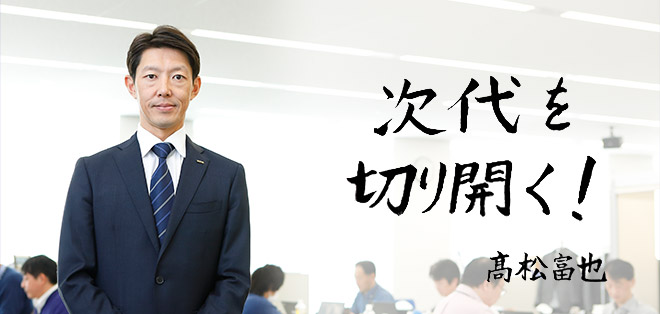
- Journey and Learning as a Management Executive
- Retrospection on His Journey Since Joining the Company
- Future Goals of the DyDo Group
- His Real Self as a Management Executive
Journey and Learning as a Management Executive
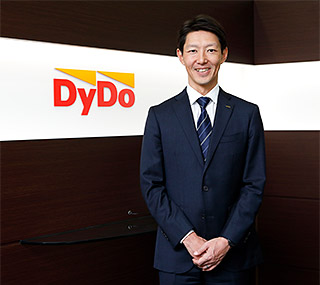 After graduating from college, I joined a leading electrical-appliance manufacturer, aspiring to make the world a more convenient place with smart houses. I was assigned to the Personnel Department and felt heavy responsibility in a role that potentially affected employees’ lives. At the same time, I was motivated by having many opportunities to listen to many people from a wide variety of fields, since the company was active in mid-career recruitment. In those days, a sense of obligation to take over the family business someday was only at the back of my mind. I was completely wrapped up in my work at hand, and “someday” seemed to be still a long way off. At any rate, I had no firm intention of positioning myself at the center of corporate management—I was just going to take over the ownership of the company.
After graduating from college, I joined a leading electrical-appliance manufacturer, aspiring to make the world a more convenient place with smart houses. I was assigned to the Personnel Department and felt heavy responsibility in a role that potentially affected employees’ lives. At the same time, I was motivated by having many opportunities to listen to many people from a wide variety of fields, since the company was active in mid-career recruitment. In those days, a sense of obligation to take over the family business someday was only at the back of my mind. I was completely wrapped up in my work at hand, and “someday” seemed to be still a long way off. At any rate, I had no firm intention of positioning myself at the center of corporate management—I was just going to take over the ownership of the company.
In 2004, in my fourth year working, my grandfather, the founder of the DyDo Group, passed away. In retrospect, at home, neither my grandfather nor my father Tomihiro Takamatsu (the previous President) told me about the family business or who should take it over. My grandfather’s death gave me an opportunity to properly learn about episodes from the time he founded the Group. Listening to them, I felt that it was my own mission to take over the business my grandfather had loved and built up. That’s when I made up my mind to join the DyDo Group.
When I took up the post of President, a highly experienced management executive imparted to me three viewpoints based on the hands of a clock: from the viewpoint of the “second hand,” you should keep an eye on the daily status of your business and quickly deal with tasks for the day, continuing to show results and achieving success; from the viewpoint of the “minute hand,” during an easily foreseeable time span of one to three years, you should keep track of company performance for each year and achieve one goal after another; and from the viewpoint of the “hour hand,” during a longer time span of a decade or two, you should predict how the world will change, and determine and show a direction in which the company will be headed. I myself maintain these perspectives with these three time spans in my work.
This is the second book in the series. While the first one, Built to Last: Successful Habits of Visionary Companies, argues the importance of visionary management, this second book is premised on visionary management and shows what is required for a company to go from “good to great.” I can relate to this book in many ways because some descriptions in it correspond to what we aim to be and to the situations our company has been in over the last few years. Since I was aware of the importance of visionary management, I began my work as President by touring our offices across Japan to communicate with all employees and share my thoughts behind the DyDo Group Philosophy and Vision with them. From now on, we will strive to make a further leap to become a great company as suggested by the book.
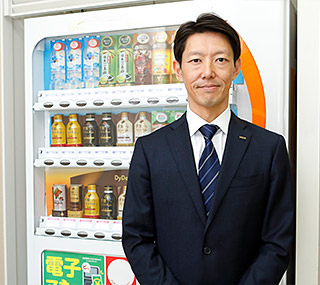 Since around 2004, when I joined the Group, the market for the vending machine business, which is our core business, has slowly taken a downward turn. I began as a route sales rep taking care of vending machines and went through all the on-site jobs in the company. Then, promoted to become a supervisor on the vending machine business, I advanced structural reforms, including the clearance of unprofitable vending machines and a revamp of the organizational structure. These reforms faced some opposition in the company, but I made persistent efforts to explain that these reforms were necessary to ensure a long continuation of our vending machine business and asked for understanding. My father, the then President, agreed with me on the need for the reforms and supported me, although I later heard second-hand that he had his own thoughts about the idea of my changing the systems he had long maintained. Without the understanding and cooperation of the employees and my father, I could not have pushed through the painful reforms.
Since around 2004, when I joined the Group, the market for the vending machine business, which is our core business, has slowly taken a downward turn. I began as a route sales rep taking care of vending machines and went through all the on-site jobs in the company. Then, promoted to become a supervisor on the vending machine business, I advanced structural reforms, including the clearance of unprofitable vending machines and a revamp of the organizational structure. These reforms faced some opposition in the company, but I made persistent efforts to explain that these reforms were necessary to ensure a long continuation of our vending machine business and asked for understanding. My father, the then President, agreed with me on the need for the reforms and supported me, although I later heard second-hand that he had his own thoughts about the idea of my changing the systems he had long maintained. Without the understanding and cooperation of the employees and my father, I could not have pushed through the painful reforms.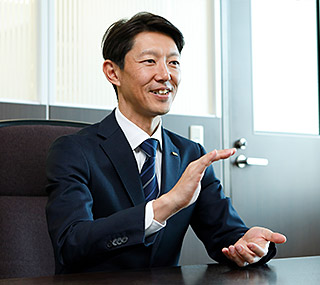 I have pushed forward various reforms since becoming President, and employees have worked with me to accomplish them. The spirit of challenge, however, has not yet fully taken root in the company. The new coronavirus swept across the world in 2020, and the business environment has been changing considerably. I know this is a worn-out cliché, but a change is a chance. Changes that are currently taking place are more drastic than ever, which means that the more quickly we respond to the changes, the bigger chance we can get. I would like each of our employees to cherish lofty aspirations and take action with strong determination. I will also continue to challenge myself, so that we can instill into our corporate culture the concept mentioned in the Group Philosophy: “continue to embrace new challenges in a dynamic way.”
I have pushed forward various reforms since becoming President, and employees have worked with me to accomplish them. The spirit of challenge, however, has not yet fully taken root in the company. The new coronavirus swept across the world in 2020, and the business environment has been changing considerably. I know this is a worn-out cliché, but a change is a chance. Changes that are currently taking place are more drastic than ever, which means that the more quickly we respond to the changes, the bigger chance we can get. I would like each of our employees to cherish lofty aspirations and take action with strong determination. I will also continue to challenge myself, so that we can instill into our corporate culture the concept mentioned in the Group Philosophy: “continue to embrace new challenges in a dynamic way.”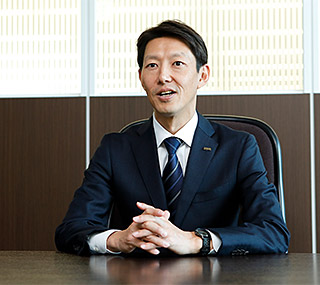 I am very emotional by nature. In my personal life, my feelings sometimes show on my face. At work, I try to behave as a cool-headed management executive who is never fazed by anything, so I am sometimes considered to have a poker face. Actually, I feel greatly excited when I am trying a new thing, although I may not reveal that.
I am very emotional by nature. In my personal life, my feelings sometimes show on my face. At work, I try to behave as a cool-headed management executive who is never fazed by anything, so I am sometimes considered to have a poker face. Actually, I feel greatly excited when I am trying a new thing, although I may not reveal that.